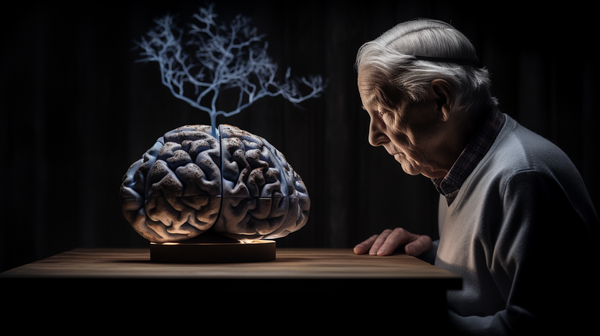"CANNABIS AND DEMENTIA PREVENTION: EXPLORING THE NEUROPROTECTIVE POTENTIAL"
Introduction to Dementia and Current Treatment Limitations Dementia, a condition characterized by a decline in memory, reasoning, and other cognitive functions, significantly impacts individuals and families worldwide.
Despite advances in medical science, current treatment options for dementia, primarily focusing on symptom management, offer limited efficacy. The complexity of dementia, involving various types and causes, poses a challenge for developing universally effective treatments.

The Potential of Cannabis in Dementia Care Cannabis, long known for its psychoactive properties, has emerged as a subject of interest in medical research for its potential therapeutic benefits in a range of conditions, including dementia.
Compounds in cannabis, such as THC and CBD, have shown promise in preclinical studies for their neuroprotective, anti-inflammatory, and antioxidant properties, which could be beneficial in treating dementia-related symptoms and possibly slowing disease progression.
Understanding the Components of Cannabis Cannabis contains numerous compounds, with THC and CBD being the most studied. THC, known for its psychoactive effects, also possesses therapeutic qualities such as pain relief and anti-inflammatory properties. CBD, on the other hand, is non-psychoactive and has been studied for its potential in reducing anxiety, improving sleep, and neuroprotection.
Scientific Research and Evidence Several studies have explored the effects of cannabis on dementia symptoms and underlying mechanisms.
While some preclinical studies suggest potential benefits in reducing inflammation, promoting neural growth, and alleviating behavioral symptoms, clinical research in humans remains limited and inconclusive.
Challenges and Controversies in Cannabis Research Research on cannabis as a treatment for dementia faces several challenges, including legal and regulatory barriers, variability in cannabis strains and components, and the stigma associated with cannabis use.
These factors complicate the standardization of research and the interpretation of results.
 Personal Stories and Anecdotal Evidence Anecdotal evidence from caregivers and individuals with dementia suggests that cannabis may offer relief from certain symptoms such as agitation, aggression, and sleep disturbances.
Personal Stories and Anecdotal Evidence Anecdotal evidence from caregivers and individuals with dementia suggests that cannabis may offer relief from certain symptoms such as agitation, aggression, and sleep disturbances.
However, these accounts lack the scientific rigor and control of clinical trials, making it difficult to draw firm conclusions.
Comparing Cannabis with Traditional Dementia Treatments When comparing cannabis to traditional dementia treatments, it is important to consider the differences in mechanisms of action, side effects, and potential for holistic benefits.
While conventional treatments primarily target specific neurotransmitter systems, cannabis offers a multi-faceted approach, potentially addressing both symptoms and disease progression.
Legal and Ethical Considerations The legal status of cannabis varies widely by region, affecting its availability for medical use. Ethical considerations also play a role, particularly in administering cannabis to individuals with dementia who may not fully understand or consent to its use.
Dosage, Safety, and Side Effects Determining the appropriate dosage and form of cannabis for dementia treatment is complex, given the individual variability in response and the lack of standardized dosing guidelines. Potential side effects, such as cognitive impairment, dizziness, and interactions with other medications, must be carefully managed.
 Future Directions in Cannabis Research and Treatment Future research on cannabis for dementia should focus on large-scale, randomized clinical trials to establish efficacy, optimal dosing, and safety profiles.
Future Directions in Cannabis Research and Treatment Future research on cannabis for dementia should focus on large-scale, randomized clinical trials to establish efficacy, optimal dosing, and safety profiles.
Additionally, exploring the effects of individual cannabis components, such as CBD and THC, could provide insights into more targeted therapies.
Innovative Treatment Strategies and Holistic Care Beyond its potential direct effects on dementia symptoms, cannabis might play a role in holistic care approaches, contributing to improved quality of life, reduced use of traditional medications, and enhanced well-being for individuals with dementia and their caregivers.
Navigating the Decision to Use Cannabis in Dementia Care For individuals and families considering cannabis for dementia treatment, a thorough evaluation of the potential benefits and risks, legal considerations, and consultation with healthcare professionals is essential.
Personal values, quality of life considerations, and the individual's specific dementia symptoms and progression should guide the decision-making process.
Conclusion: A Promising yet Uncertain Horizon The exploration of cannabis as a treatment for dementia presents a promising yet uncertain horizon. While preclinical evidence and anecdotal reports suggest potential benefits, the lack of robust clinical data underscores the need for further research.
As the scientific community continues to unravel the complexities of dementia and the therapeutic potential of cannabis, a cautious yet open-minded approach is warranted.
Frequently Asked Questions
Q: Can cannabis truly prevent dementia, or is it just a myth?
A: Current scientific research suggests that certain compounds in cannabis, particularly CBD, may have neuroprotective properties that could potentially help in preventing dementia. However, more extensive and longitudinal studies are necessary to fully understand its efficacy and mechanisms.
Q: How does cannabis interact with the brain to offer protection against dementia?
A: Cannabis interacts with the brain's endocannabinoid system, which plays a role in maintaining brain health and regulating inflammation and neurogenesis. These interactions may help in protecting neural pathways, thereby potentially reducing the risk of neurodegenerative diseases like dementia.
Q: Are there any risks associated with using cannabis for dementia prevention?
A: Like any therapeutic intervention, using cannabis carries potential risks, particularly concerning dosage, the psychoactive effects of THC, and possible interactions with other medications. It's crucial to consult healthcare professionals before considering cannabis for dementia prevention.
Q: What are the best strains of cannabis for preventing dementia?
A: Strains high in CBD and low in THC are often recommended for their potential therapeutic benefits without the strong psychoactive effects. Strains like ACDC, Charlotte's Web, and Harlequin are frequently cited, but individual responses can vary.
Q: Where can I find reliable information and quality cannabis products for therapeutic use?
A: For reliable information, consult academic journals, reputable medical cannabis research organizations, and healthcare providers specializing in cannabis therapy. For quality cannabis products, especially for therapeutic use, consider licensed dispensaries or trusted providers like LokkBoxx, which offer a range of options with detailed product information.
"Discover a world of discretion and elegance with our unique humidor stash boxes. Check out our website now to explore our exclusive collection!"
--
|
More Articles here |
| "ELEVATE YOUR CANNABIS EXPERIENCE: A COMPREHENSIVE SMOKING GUIDE" |
| "THE ESSENTIAL GUIDE TO THC: EVERYTHING YOU NEED TO KNOW ABOUT CONSUMPTION AND EFFECTS" |








